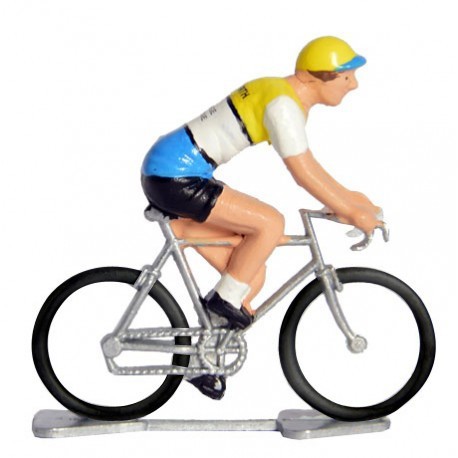No products
 View larger
View larger Pelforth-Sauvage Lejeune K-W - miniature cyclists
PSLW
New product
miniature cyclists
Handpainted miniature cyclist with Pelfoth-Sauvage Lejeune jersey.
-Completely produced out of metal: bike + cyclist
-Dimensions: height 50mm x width 50mm
-Weight: 23 grams
1 Item
- Remove this product from my favorite's list.
- Add this product to my list of favorites.
Data sheet
| Type | K |
| Posture | Standard |
| Gender | Male |
| Colour | Multi color |
| Period | 1961-1970 |
| Material | Zamac |
| Height | 50mm |
| Width | 50mm |
| Depth | 16mm |
| Weight | 23g |
| Painted | Cyclist + Wheels |
More info
Jan Janssen
Pelforth-Sauvage-Lejeune was a cycling team in the 60s.
It rode with a French licence from 1960 to 1968. The most famous rider was undoubtedly the Dutchman Jan Janssen. Janssen won the Tour de France in 1968.
Other riders who rode for the team: Armand Van den Bempt, Bernard Guyot, Bernard Van De Kerckhove, Claude Guyot, Édouard Delberghe, Émile Bodart, Fernand Etter, Gilbert Capiau,Hubert Niel, Jean Vidament, Jean-Claude Lefebvre, Jean-Marie Gorez, Jean-Marie Leblanc, Jean-Pierre Ducasse, Johny Schleck, José Catieau, José Samyn, Maurice Morin, Philippe Crépel, Robert Legein, Roger Milliot, Roman Chtiej, Willy Monty, ...
Co-sponsors:
1960-1960: Pelforth 43-Carlier
1961-1961: Sauvage-Lejeune-Pelforth 43
1962-1968: Pelforth-Sauvage-Lejeune
Jan Janssen was a professional cyclist from 1962 to 1972. With his blond hair and glasses he was a striking figure in the peloton. His biggest successes were winning the World Road Championships, winning the Tour de France and the Tour of Spain. This made him the first Dutchman to win the Tour or the Vuelta. In the Tour he won a total of 7 stages, and he had the yellow jersey for 2 days.
Janssen has been riding for French teams in his career. The longest period he cycled at Pelforth-Sauvage Lejeune. Pelforth is a French beer brand based in Lille. It is now part of the Heineken group. Lejeune, also known as Sauvage Lejeune or Cycles Lejeune, was a French manufacturer of racing bikes.
Janssen was a very good sprinter, but soon he evolved into a rider for the stage races. In 1964 he won his first stage race, Paris-Nice. He also won two stages and the green jersey in the Tour de France. He became world champion later that year in Sallanches (France). In 1965 he became the sprint king again and won the green jersey. In 1966 he was very close to winning the general classification for the yellow jersey.
He would have to wait until 1968 to win the Tour de France. He beat the Belgian Herman Van Springel by barely 38 seconds. Janssen hadn't worn the yellow jersey before the podium in Paris. The last stage was an individual time trial in which he jumped over Van Springel in the GC and won the Tour himself. That mere 38 seconds was the smallest margin for a long time until Greg LeMond won the Tour of Laurent Fignon in 1989 with only 8 seconds. In 1968 the Tour was organised for national teams and not for factory teams. Because of this Janssen didn't ride in the blue, yellow and white of Pelforth-Sauvage Lejeune, but in the Dutch orange jersey. It was tour manager Felix Lévitan who made the decision to start with country teams. This was a reaction against the sponsors who had organised strikes against doping tests the year before. After his career Jan Janssen ran a small company that makes bicycle frames.
The teams Janssen rode for:
1962-1962 Locomotive-Vredestein
1962-1968 Pelforth-Sauvage-Lejeune
1969-1971 Bic
1972_1972 Beaulieu-Flandria
His most important victories:
Tour de France:
-General classification in 1968
-Points classification in 1964, 1965 and 1967
-7 stages
Tour of Spain:
-General classification in 1967
-Points classification in 1967 and 1968
-3 stages
Stage races:
Paris-Nice in 1964 and the Tour of the Netherlands in 1965
Classics: Zurich Championship in 1962, World Champion in 1964, Bordeaux-Paris in 1966 and Paris-Roubaix in 1967.
Discover our other miniature cyclists as well.


